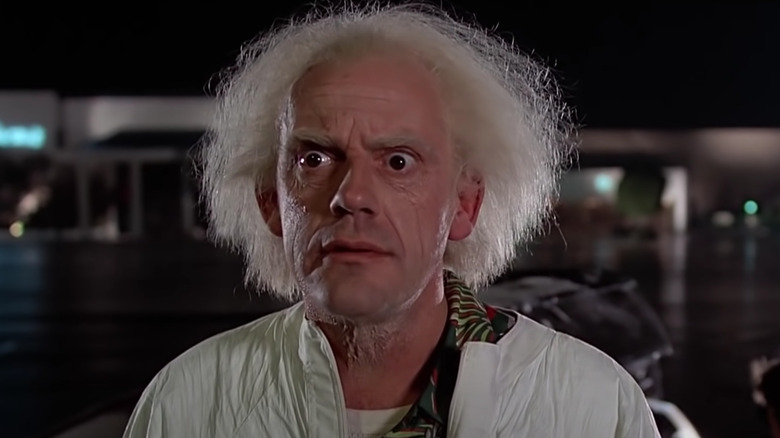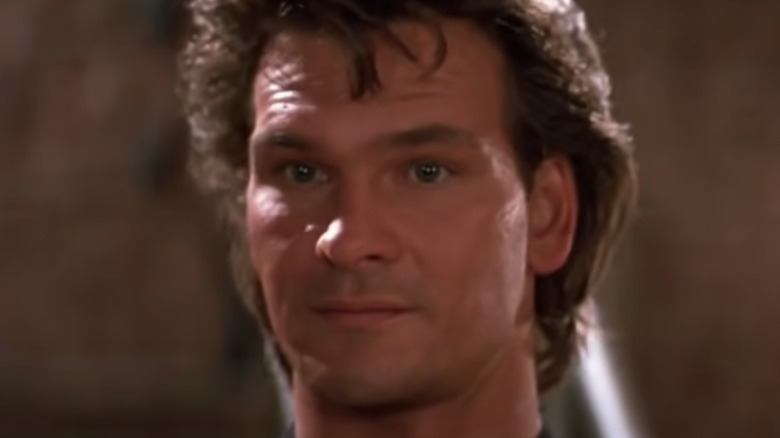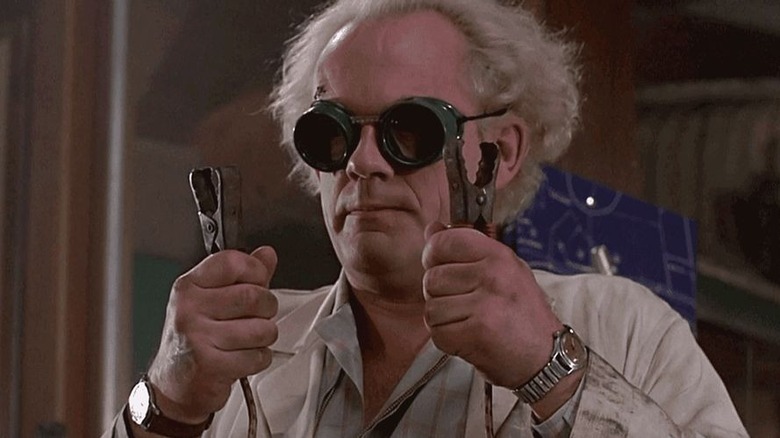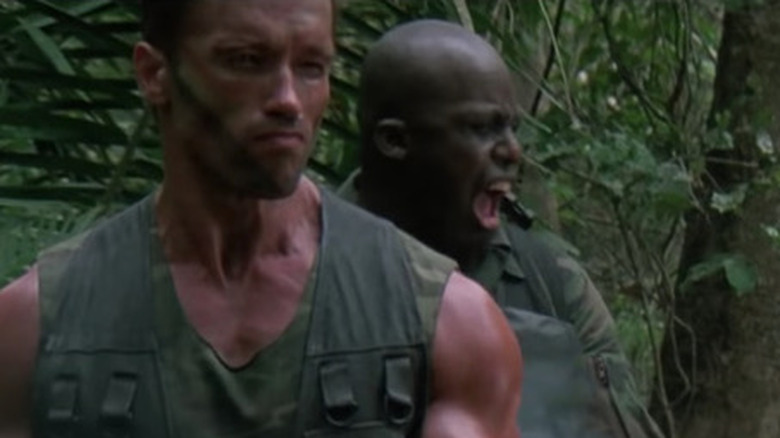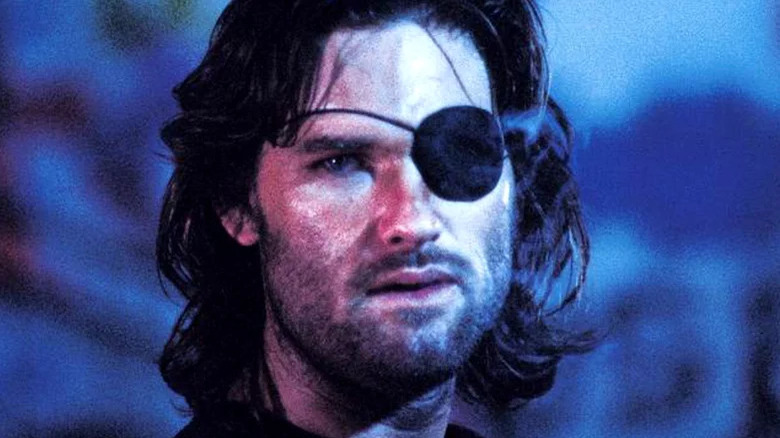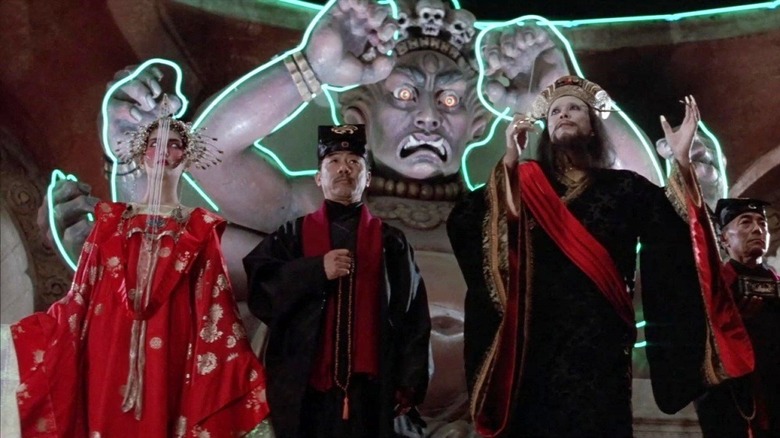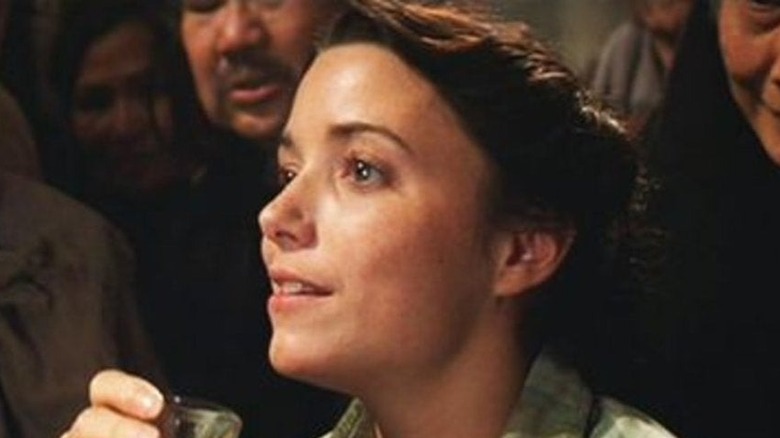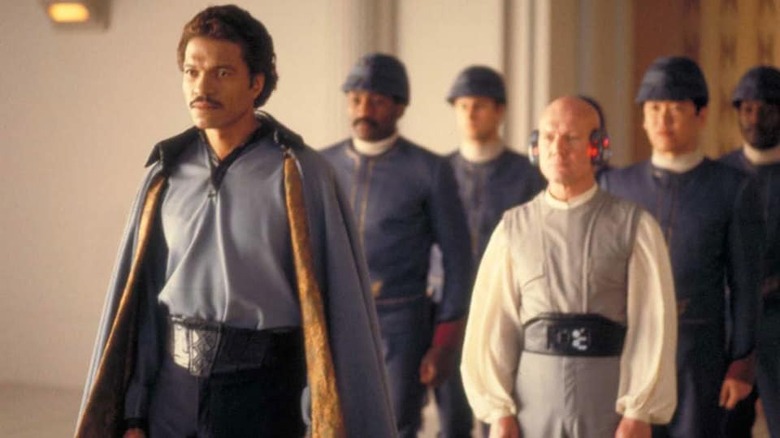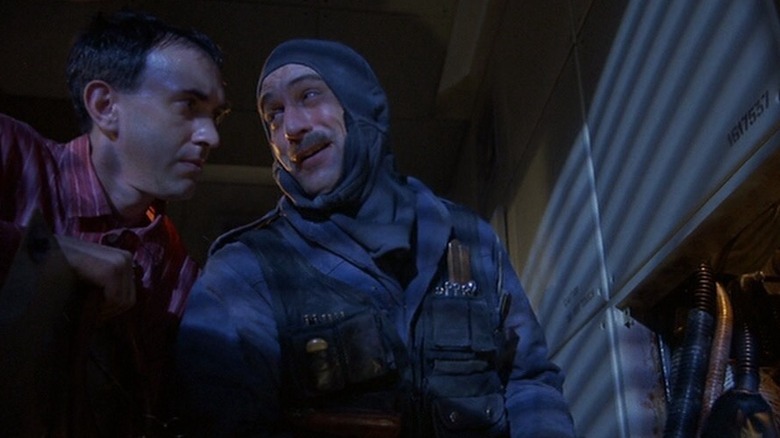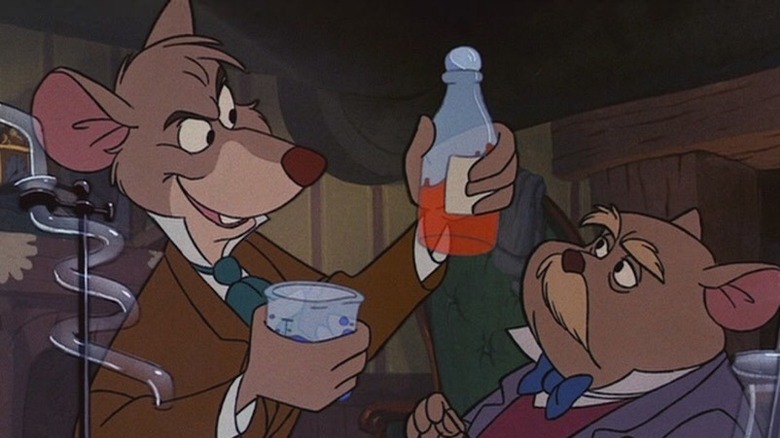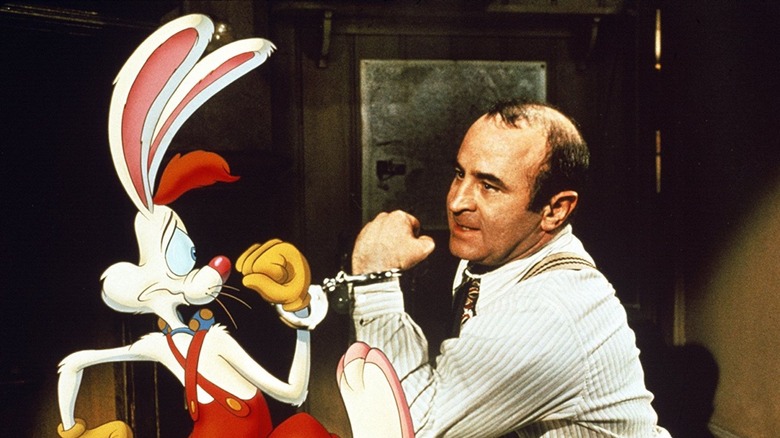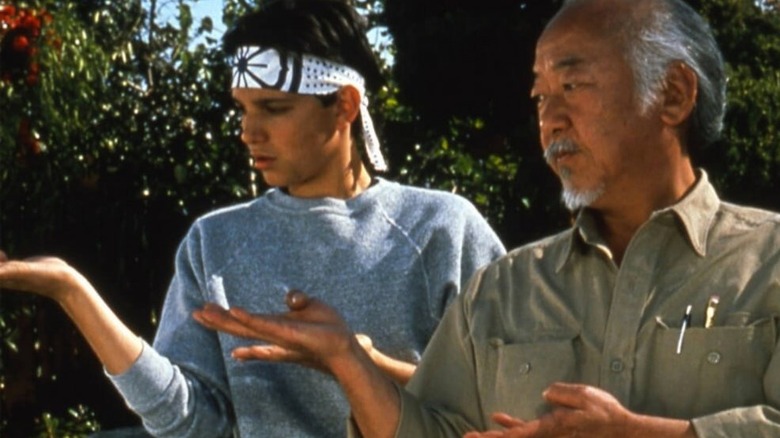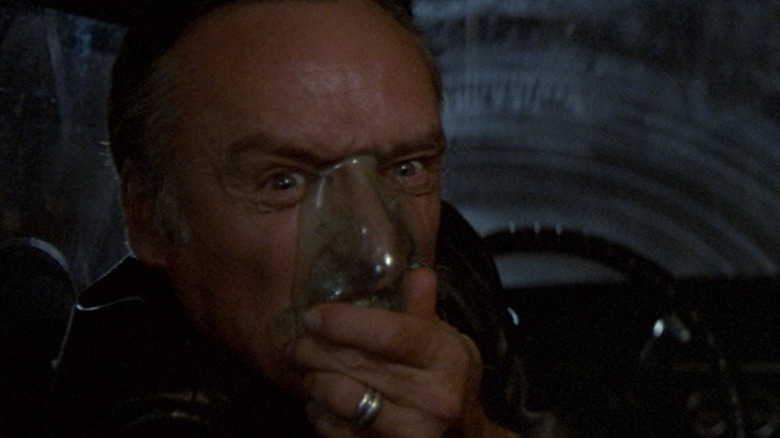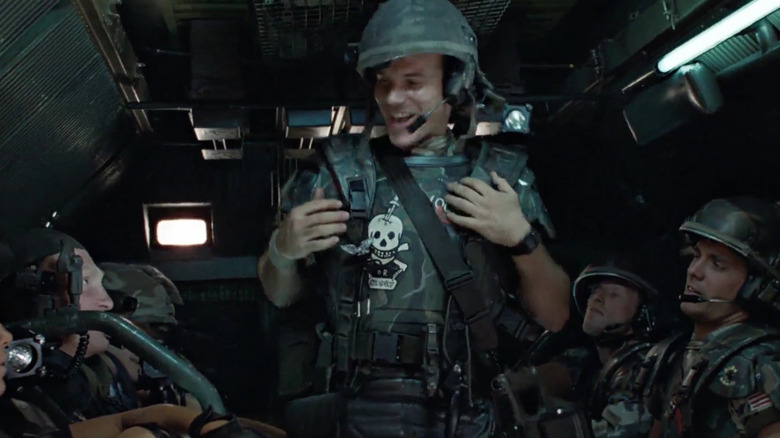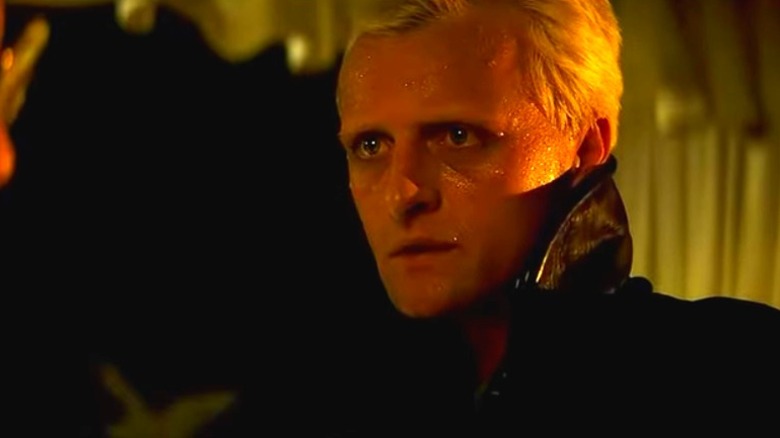Characters From '80s Movies Who Need Their Own Origin Stories
With the rise of multi- and extended cinematic universes, origin story films charting the life and times of a single character have become pretty standard fare in theaters. However, long before characters like Thanos or Tony Stark were household names, movies mostly introduced audiences to characters at the start of the film and then let them be at the end (unless a movie turned into a franchise, and even then protagonists were usually the focus). Until recently, backstory was either colored in through dialogue or flashback. While these are effective storytelling methods, there are plenty of characters who deserve their own fleshed-out origin story. So many, in fact, that some fans may feel it's a waste that the idea of origin movies didn't exist as such when their favorite films and franchises were introduced.
To pay homage to the great characters who arrived on screen before the age of endless spinoffs, here's a list of characters from the decade when genre, big action, and high-concept sci-fi blockbusters first arrived as we know them today: the 1980s.
James Dalton
In 1989, Patrick Swayze starred in "Road House" — arguably one the best "bad" movies of all time. "Road House" tells the story of James Dalton (everybody just calls him Dalton), the best bar bouncer or "cooler" in the business. When Dalton gets a new job cleaning up the rough titular bar in a sleepy Missouri town, he finds himself at odds with a local crime boss who enjoys keeping the town's citizens under his thumb. What follows is the best movie about bar fights ever to grace the silver screen. Fun and wild, this classic is endlessly rewatchable.
What raises "Road House" above other fight movie schlock is its commitment to revealing bizarre details from Dalton's past. For example, Dalton is not only a martial arts master but also has a degree in philosophy from NYU. Revelations like these make the idea of a Dalton origin story enticing for fans.
How did Dalton and cooler mentor Wade Garrett — played by a silver-maned Sam Elliott — meet up? Where did Dalton learn all that kung fu and find time to get a degree in philosophy? Who taught Dalton to rip a man's throat out of his neck? And how did Dalton and blind blues band leader Cody originally meet? While making anything attached to "Road House" without the late Swayze's presence may seem like sacrilege to fans, answering these questions in a prequel about Dalton as a younger man could definitely be compelling and win over naysayers.
Doc Brown
1985's "Back to the Future" follows Marty McFly's attempts to return to the present after getting stranded 30 years in the past. Oh, and he has to ensure his parents fall in love before he returns to the present, or he will cease to exist. It's one of the greatest movie hooks of all time. The film was such a smash hit that it launched a franchise.
However, the movie series does leave a few pretty large questions unanswered, the biggest being Marty's relationship with partner-in-time-shenanigans Doc Brown (played by the iconic Christopher Lloyd). To quote the musings of comedian John Mulaney, "Back to the Future" never explains how or why Marty and Doc Brown, "a disgraced nuclear physicist," are friends. The movie trusts the audience to just go with it. Indeed, by the time Marty's driving Doc's atomic-powered DeLorean time machine, the audience is pretty much along for the ride.
While these holes in Doc and Marty's story are funny (their dynamic inspired "Rick and Morty"), they also set up an origin story movie for Doc beautifully. The movie could dive into Doc's past, explore his fall from scientific grace, and maybe shed some more light on his endearing friendship with a high schooler. At the very least, it could show audiences just how Doc managed to contact Libyan terrorists with plutonium connections from Hill Valley, CA. Considering the franchise netted nearly a billion box-office bucks, it's worth a producer's consideration.
Dutch
1987's sci-fi action "Predator," with its charismatic special forces team and its straightforward plot, leaves a lot of room for an origin movie. "Predator" depicts a group of elite soldiers struggling to survive after they become the prey of a monstrous alien. Spoiler — things go poorly for the soldiers. Pro wrestler Jesse Ventura gets one of the all-time great action quips in "I ain't got time to bleed." But things do go well for lead actor Arnold Schwarzenegger, who delivers a suitably muscled and aggressive performance as special operations leader "Major" Dutch.
Arnie runs away with the movie. The concept is basic, and actors play most everything pretty straight to pull it off. Not to say there's no levity, but there's certainly none of the self-aware, winking-at-the-audience notes Arnold hits in movies like "True Lies" or "The Last Action Hero." From the first frame until the last, Dutch is the coolest guy around.
All of this adds up to a character who's practically begging for their own origin story. Plus, the movie could go in any number of directions. It could follow Dutch from basic training to his first significant mission, or star a now-older Arnold reflecting on his formative years through a series of flashbacks. Whatever path the movie takes, if it ever gets greenlit, fans everywhere will get to the choppers to go see it.
Snake Plissken
Snake Plissken from John Carpenter's "Escape From New York" is a character practically begging for an origin story. In the movie, Kurt Russell's Plissken is a former special forces soldier tasked with rescuing the US President after the President's plane crashes in New York City. Sounds like it's not such a big deal — after all, Sully Sullenberger managed just fine. However, in Carpenter's dystopian vision, the island of Manhattan has been converted into an open-air prison by America's fascist government. Not a place you want to linger in.
Beyond being immensely entertaining, the movie also raises a lot of questions about its protagonist. Plissken is an eyepatch-wearing, snake-tattooed, only-in-the-'80s action hero with enough charisma to carry, well, a film franchise. But when audiences first meet the man, he's imprisoned by the Carpenter-verse's dystopian government. "For what?" some might ask. The answer's simple: He tried to rob the Federal Reserve. A botched robbery on the US banking system sure sounds like good fodder for a spinoff. Plus, the movie could explain how he lost his eye and what his time in the special forces was like. An origin movie would be a great opportunity to explore just how the US became a fascist state and when Snake discovered he was working for the bad guys before striking out on his own.
David Lo Pan
John Carpenter's cult classic "Big Trouble in Little China" follows Kurt Russell's buffoonish truck driver Jack Burton as he helps rescue his friend's fiancee from the clutches of a mystical crime boss. It's a ridiculous premise, but it works because it's executed by a cast and crew who are clearly having a ball hamming it up on screen. The movie has tons of '80s magic going for it, including practical creature effects that have aged into fine camp and Russell throwing corny quips like "the check's in the mail." (The movie's attitude toward race hasn't aged as well). However, the real scene-stealer is the movie's villain: David Lo Pan.
David Lo Pan, played by journeymen actor James Hong (the guy's been in a lot of movies), is not your average movie gangster. His henchmen have the literal power of the elements, his front business is hiding an underground lair filled with monsters, and he's an ancient sorcerer who was cursed to remain trapped in a decrepit body by Emperor Qin Shi Huang. If that doesn't scream "entertaining origin movie," what does? The movie could follow Lo Pan's journey to San Francisco and viewers could watch him stake a claim as the boss of the underworld with the help of his supernatural abilities. Considering both James Hong and John Carpenter are still alive and fairly active in the industry, this origin story feels like a slam dunk. Dwayne Johnson was set to produce a sequel, but the project seems to have been shelved, and interviews with the screenwriter made it clear it would not have focused on Lo Pan.
Marion Ravenwood
"Raiders of the Lost Ark" introduced audiences to the most iconic action hero to ever crack whips and punch Nazis: Indiana Jones. While the movie launched the globe-trotting adventurer franchise, it didn't explore Indy's most interesting love interest, Marion Ravenwood. Marion, played by the always-excellent Karen Allen, is an absolute firebrand of a human being. Her likability and believable chemistry with Harrison Ford are large parts of why the first movie works so well. Sadly, since she only appears in the first and fourth movie in the franchise, Marion's backstory is largely left unexplored.
But that oversight could be quickly remedied with an origin movie. The bits and pieces the audience gets about Marion's background are easily the stuff of prequel proportions. Her father was Abner Ravenwood, an archaeologist obsessed with recovering the Ark of the Covenant. Indy worked with Abner at one point and even had an illicit affair with Marion when they first crossed paths. Hollywood, we're begging you: Greenlight this picture. Fans of the Indy-verse would come out in droves to learn a bit more about the franchise's characters when they were young. Although the number of action movies with strong female leads is growing, we could always use more. On top of all that, Marion's origins could finally explain exactly how she came to be in a dive bar in Nepal and how she could out-drink a mountain man a few times her size.
Lando Calrissian
The "Empire Strikes Back" not only introduced "Star Wars" fans to Luke's father, but also to the coolest character in a galaxy far, far away: Lando Calrissian. Up until the sequel to "Star Wars: A New Hope," most fans would have declared Han Solo the suavest guy with a lightspeed ride — and then they met Lando. Lando, played by Billy Dee Williams in the original trilogy, shows up like a supernova of charm, capes, and grins to briefly outshine the rest of the franchise's charismatic stars. He's practically begging for an origin story in every scene he steals.
Sure, he betrays Solo in "Empire," but he more than makes up for it in "Return of the Jedi" when he helps the rebels destroy Death Star Junior. What's more important, however, is the movie powers that be already have the perfect actor to portray the icon in Donald Glover. Glover made his debut as a young Lando in 2018's "Solo: A Star Wars Story" and like, Williams before him, ran off with the movie. It's a rare, rare thing when casting meets character in such sweet harmony, so hopefully the opportunity doesn't get wasted. Disney+ is producing a spinoff series about Lando, but we'd like to see his backstory explored on the silver screen.
Archibald Harry Tuttle
Terry Gilliam's dystopian cult classic "Brazil" has a ton going for it. Its set design is one of a kind and Gilliam's vision of a dystopia dangerously bogged down by bureaucracy is chillingly absurd. And then there's an unexpected appearance from Robert De Niro. In the film, De Niro plays the terrorist Archibald "Harry" Tuttle. However, Tuttle isn't all that bad — he mostly just fixes air conditioning units for citizens who go ignored by the slow-moving and fascistic Central Services. It's a far cry from De Niro's typical gangster fare and a very endearing role.
Tuttle's battle with "Brazil's" antagonistic government is not only a perfect example of the horrifying world Gilliam depicts in the film, but also makes up the movie's most interesting scenes. Part of this is due in no small part to De Niro's charisma, but the AC repairman/terrorist bit is so darkly funny it needs to be explored further. While this pick is probably the least likely to ever happen, there's a ton of potential for a Tuttle origin story.
The movie could give Gilliam, or another director, the chance to more deeply explore "Brazil's" fascinating world. Or, maybe Tuttle's origin movie could play out during the Central Service's rise to power. Either way, the opportunities a Tuttle movie presents for heady entertainment and grimly funny satire are endless.
Basil of Baker Street
The 1980s represent an odd time for Disney Studios' canon. Following the success of music-filled '70s classics like the "Aristocats," "The Muppet Movie," and "Robin Hood," Disney movies delved into dark territory. The result was a slew of great movies that go largely unrecognized today. They were also further overshadowed by hits the company produced in the '90s during The Disney Renaissance. Disney's '80s run includes "Oliver & Company," "The Black Cauldron," and "The Great Mouse Detective" — not as famous as big hits like "Aladdin" or "The Little Mermaid," but still quirky and appealing in their own right.
Due to all of this, a movie like "The Great Mouse Detective" probably won't be receiving a sequel anytime soon. That's a shame, because it's one of Disney's best animated adventure offerings. Based on the children's book "Basil of Baker Street," "Detective" follows Basil as he sleuths around Victorian London saving the innocent and protecting Queen and country.
Basil is a phenomenal character — he's essentially the anthropomorphic mouse version of Sherlock Holmes — who even comes with his own ready-made archnemesis: Professor Ratigan. If the decision to revisit this property is ever approved, an origin story charting the rise of Basil and his rivalry with Ratigan would certainly interest fans of the series. With the recent success of shows like the BBC's "Sherlock," Disney's mouse version should be a deadlock for success. Here's hoping it happens and that they make it a ride, too.
Eddie Valiant
When "Who Framed Roger Rabbit?" premiered in 1988, critics marveled at both its technical achievement and singular vision, and what a vision it is. "Rabbit" depicts a universe where cartoons and the humans they entertain coexist. Put another way: In "Rabbit," when Daffy Duck isn't filming the latest Looney Toon, he's performing as a dueling pianist against Donald Duck in a local dive bar. Yeah, it's that awesome.
The movie plays like a film noir and follows the effort of PI Eddie Valiant (Bob Hoskins) to prove the innocence of the famous toon Roger Rabbit after Roger is framed for murder. Throughout the movie, characters remark on Valiant's tortured past. As the story unfolds, it's revealed that Valiant used to be a friend to toons until one killed his brother. While the movie explores Valiant's backstory through dialogue over the course of the film, a movie going back in time to follow Valiant's early gumshoe days could result in capital "E" entertainment.
A Valiant origin film makes all kinds of space for some epic toon action. Valiant could link up with different toons for various capers and give fans a ready-made excuse to go back to a unique film world. Valiant could help Foghorn Leghorn beat an underground boxing rap or investigate Prince Charming for having an affair. The possibilities are as wild as they are infinite.
Mr. Miyagi
Given the immense popularity of the "The Karate Kid's" spinoff show "Cobra Kai," an origin movie about Daniel LaRusso's master Mr. Miyagi seems like an obvious layup. Miyagi — with his endless wisdom, mastery of all things karate, and deep appreciation of gardening — is a character rich with backstory. While some of his origins are explored in "The Karate Kid Part II” when Miyagi and Daniel return to Miyagi's hometown on Okinawa, Miyagi mostly remains a mystery throughout the series. For example, after leaving Okinawa as a young man, Miyagi attends the University of California Santa Barbara, is forced into a Japanese internment camp, and then volunteers to join the United States military to serve during WWII. He also earns the Medal of Honor during his service.
That's one of the most readily cinematic backstories ever, and one that audiences craving diversity would certainly flock to. Instead, "Karate Kid" shows the audience the trials and tribulations of a kid from New Jersey transplanted to The Valley in California. Not to say it's a bad movie — it's an '80s classic — but it's not nearly as exciting as the life and times of Miyagi. Since Netflix has been doing well with the franchise, maybe they'll consider expanding the "Karate-verse."
Frank Booth
Director David Lynch's "Blue Velvet" is both brilliant and deeply, deeply disturbing. In the movie, Lynch mixes bland suburban Americana with eccentricity, sexual perversion, and violence to make a convincing case that evil can take root anywhere. However, Lynch might not have achieved his vision without the help of Dennis Hopper, who played the film's deranged central antagonist: Frank Booth.
Frank is the boogeyman of movie villains. Anyone who's seen "Blue Velvet" will likely exit the viewing knowing Frank's not real and then check their closet for him before they go to sleep. He's not fun or distantly sympathetic, like the Joker or tragic Darth Vader; he's just awful. If any actor besides the late great Hopper had initially played the part, Frank wouldn't be on the list.
But Hopper's performance is so vile and charismatic, he turns Frank into a proverbial train wreck from which viewers just can't look away. There are so many questions that could be explored: How'd he get started on the gas tank and the split personalities? Whence his love of Pabst Blue Ribbon and hatred of Heineken? How did he collect such an, um, distinctive posse? These questions are why he's such a strong candidate for an origin movie. While the movie would have to be made without Hopper (RIP), Lynch's surrealist stylings could find a way to splice moments from the original movie in. Admittedly, it's a tall order, but Frank's one of the most memorable movie villains of all time and a rare character who makes the grotesque engaging to watch.
Colonial Marines
The opening moments of "Alien" sequel "Aliens" make it appear like director James Cameron has decided to maintain the cold, distant atmosphere from the first movie, directed by Ridley Scott. Then the Colonial Marines show up and the slow dread of the first movie evaporates. Their entry into the sequel is essentially Cameron announcing that he may be helming a sequel, but it's still his movie.
The Colonial Marine squadron is captivating from the minute they arrive on screen. The movie follows their mission to take the only survivor from the alien encounter in the first film to investigate the disappearance of a lost space colony. The gang encounters the titular monsters and heavy casualties ensue. While not all of the Colonial Marines are wiped out by the end of the movie, most of them don't make it. But the swagger they enter the film with is strong enough to launch an entire spinoff franchise — starting with an origin movie.
From the tough-as-nails heavy gunner Vasquez (played by Jenette Goldstein and her jawline of steel) to the wisecracking Hudson (played to perfection by Bill Paxton), the entire cast of Colonial Marines is just straight-up delightful. Their origin movie could follow their first meeting at basic or their first successful mission. Anything involving this crew would be entertaining, and it'd be nice to see them win one for a change.
Roy Batty
1982's "Blade Runner" has enjoyed more staying power than most science fiction films. It has influenced dystopian set design for decades, it has been reflected in countless movie scores, and it was even followed up by a stellar sequel, "Blade Runner 2049," in 2017. "Blade Runner" depicts a future in which massive corporations and governments enslave humanoid androids, known as "Replicants," to do all the jobs humans won't do. Replicants are programmed to die in four years to prevent revolution. Blade Runners are agents who kill replicants who break protocol. The movie follows the titular agent as he traces a new batch of particularly dangerous targets.
While there's a lot to love about this movie, many fans point to the film's closing monologue from antagonist Roy Batty as the high-water mark of the film. During the monologue delivered before his death, Batty reveals he's "seen things you people wouldn't believe" and proceeds to list some of the incredible events he's experienced due to the peculiar circumstances of his existence. Given the sci-fi radicalness of the events he describes — "attack ships on fire off the shoulder of Orion" and "C-beams glittering near the Tannhäuser Gate" — it's not a stretch to imagine most audiences have been clamoring for these events to be depicted since the film's release. CGI technology is better than ever these days, so these events could be convincingly rendered. Dutch actor Rutger Hauer and his piercing gaze are sadly no longer around, but we're sure a carefully chosen actor could bring the same robotic stoicism to the role. So in that spirit: Please make a Roy Batty origin movie, before interest in the "Blade Runner" franchise is inevitably lost to time, like tears in rain.
